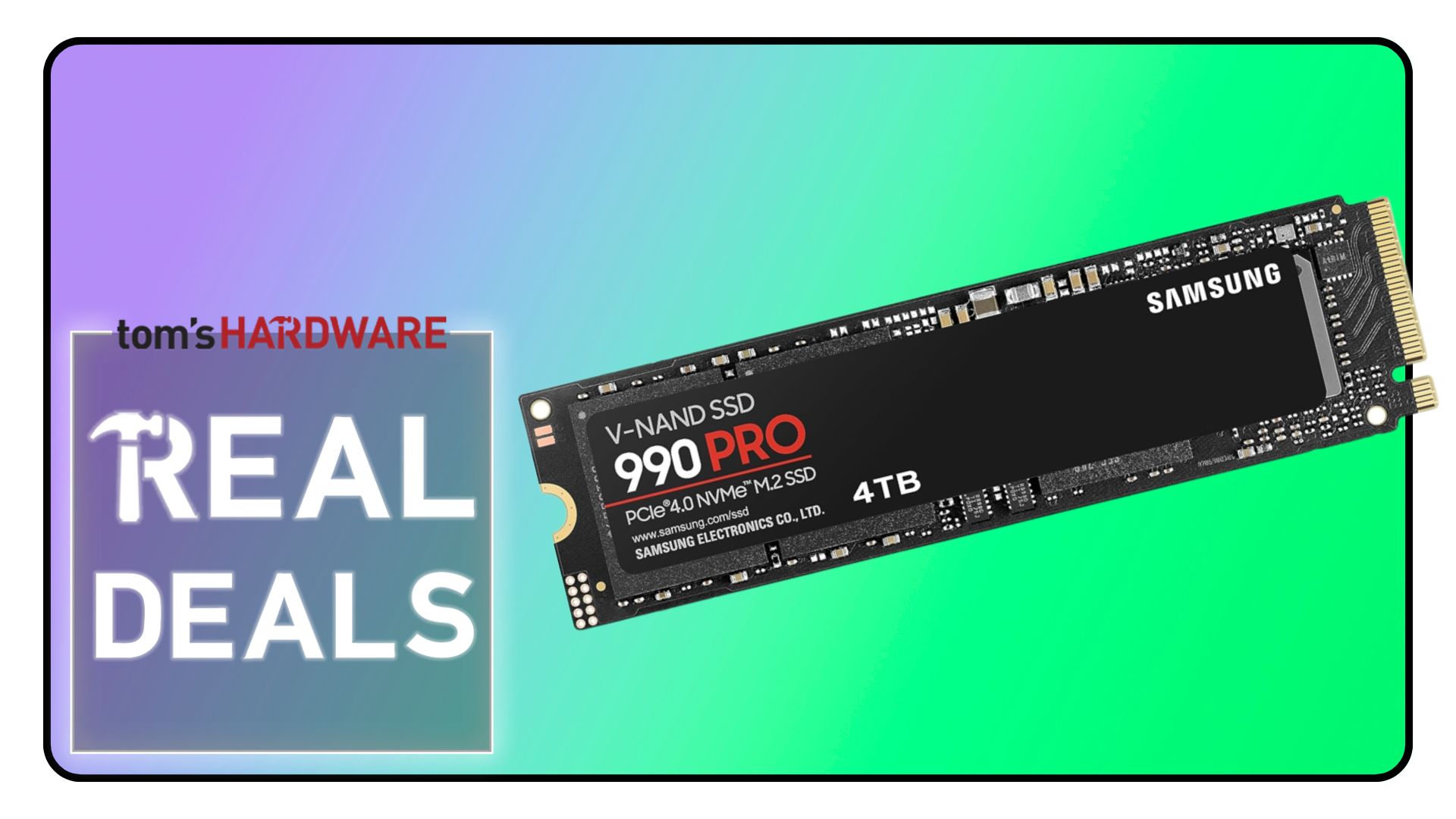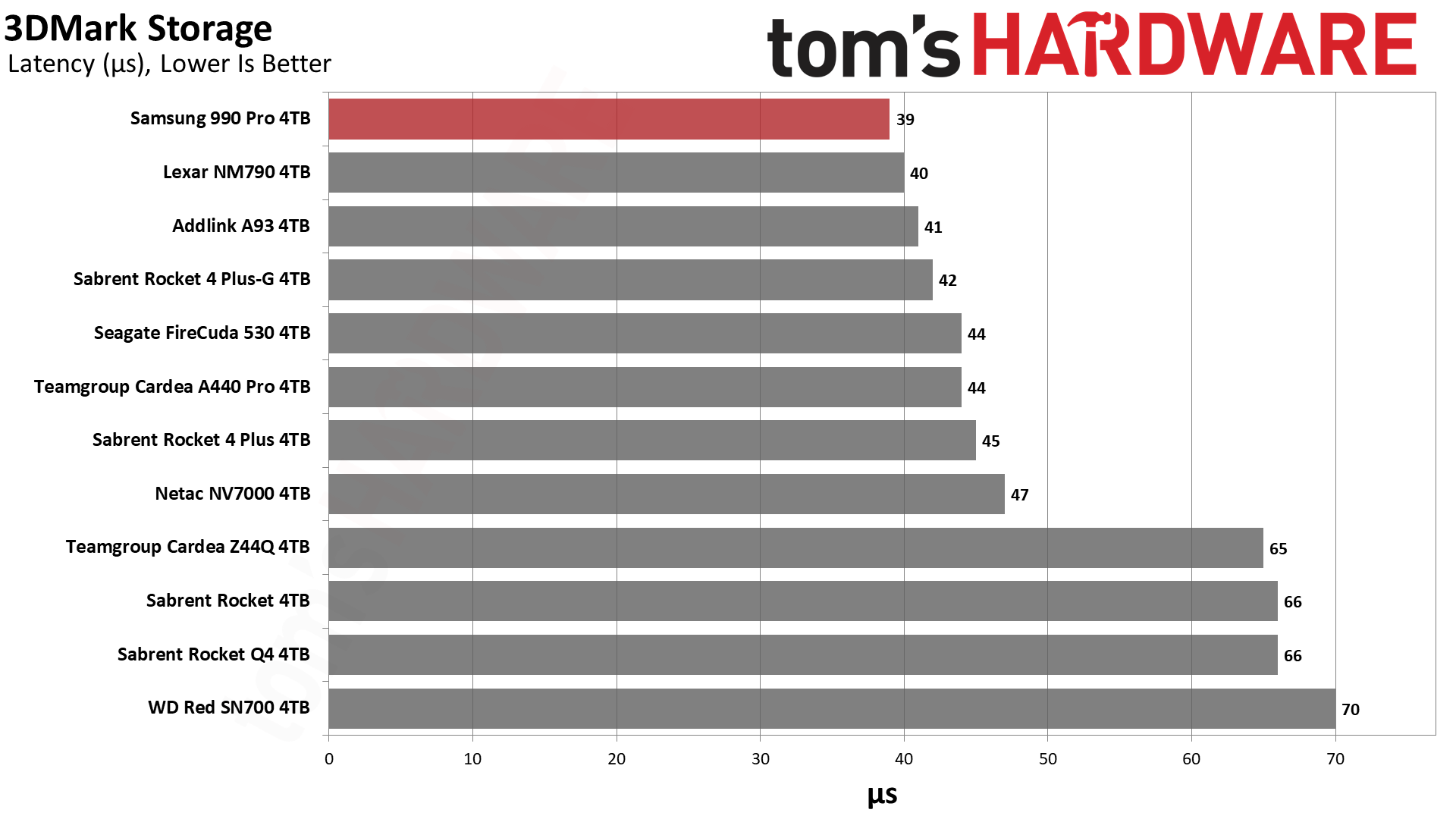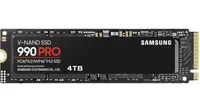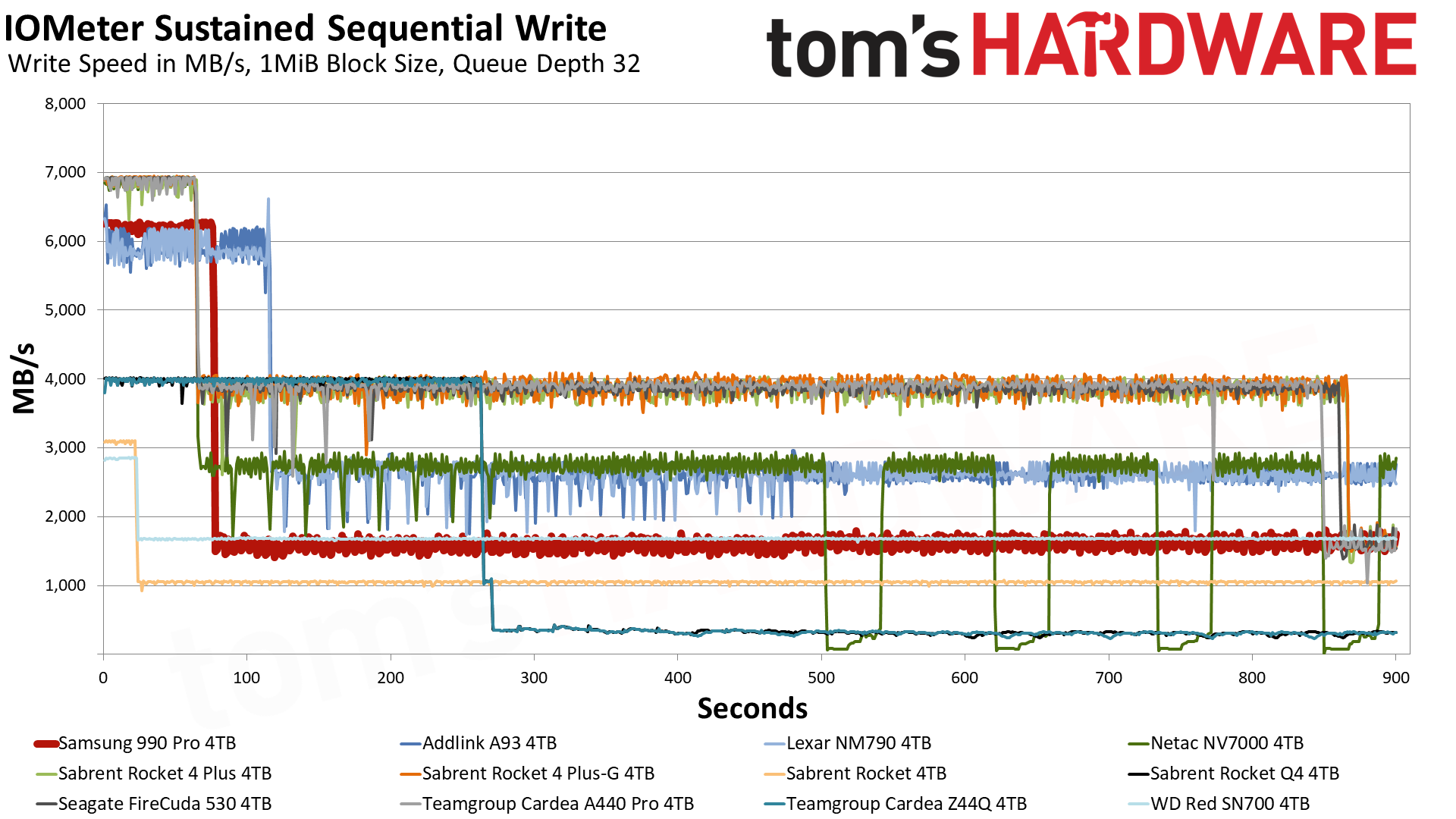4TB Samsung 990 Pro SSD hits 7 cents per GB — hot deal on best PCIe 4 drive
Spend just $299 to get the best drive in its class.

The fastest PCIe Gen 4 drive you can buy, the 4TB Samsung 990 Pro offers extremely fast performance and whopping amounts of capacity in a single-sided M.2 2280 form factor. We cannot help but recommend this drive when it's on offer, and currently, it's on sale for one of its lowest prices in recent memory.
Ahead of Prime Day, you can find the Samsung 990 Pro 4TB SSD for just $299 or 7 cents per GB at Amazon as it's currently reduced in a limited-time deal. I've found that the same price can also be had at Newegg and B&H Photo.
We reviewed the 990 Pro 4TB when it was released, and not only is it one of the best 4TB SSDs on the market and among the best SSDs overall, but this SSD also boasts maximum sequential reads of 7,450 MB/s and sequential writes of 6,900 MB/s with random reads/writes coming in at 1.6 million and 1.55 million IOPS, respectively, while endurance is rated for 2,400 TBW.
Samsung 990 Pro (4TB) SSD: now $299 at Amazon (was $464)
The Samsung 990 Pro 4TB is among the fastest Gen 4 SSDs available thanks to read and write speeds of up to 7450/6900 MB/s, almost maxing out the Gen 4 bandwidth. This M.2 NVMe drive comes in the 2280 form factor and holds enough capacity to store a large selection of your favorite games or files.
Random reads/writes come in at 1.6 million and 1.55 million IOPS, respectively, while endurance is rated for a respectable 2,400 TBW.
See our review of Samsung's 990 Pro 4TB for more details.
Samsung achieves its 4TB capacity using a 236-layer TLC V-NAND and uses a single-sided design, making it ideal for use in smaller setups - especially laptops of PlayStation 5 consoles where space is a premium.
When we tested the Samsung 990 Pro 4TB, we found it dominating the competition on almost every test. For example, on 3DMark's storage test, it had the lowest latency, which is great for gaming.

The Samsung 990 Pro is also excellent at sustaining strong write performance. If you're writing continuously for several minutes on most drives, you'll notice a huge performance drop as the the data fills up the high-speed cache and ends up using the slower TLC NAND Flash. We test sustained write speeds using Iometer for 15 minutes.
In our tests, the 4TB 990 Pro was able to maintain a speed of 6.2 GB/s for 75 seconds thanks to its generous 10GB of pSLC cache. Once the data spills over into the TLC, it operates at a -- strong, compared to most drives -- 1.6 GB/s.
The Samsung 990 Pro is also a leader in power efficiency, delivering 421.1 MB/s per watt. That number puts it ahead of all competitors but the Addlink A93 4TB and Lxar NM790 4TB.
Get Tom's Hardware's best news and in-depth reviews, straight to your inbox.

Stewart Bendle is a deals and coupon writer at Tom's Hardware. A firm believer in “Bang for the buck” Stewart likes to research the best prices and coupon codes for hardware and build PCs that have a great price for performance ratio.
-
bit_user Reply
Okay, my bad. The review confirms even the 4 TB model is single-sided:jmkabq said:??? :( The article specifically states that its a one sided drive.
https://www.tomshardware.com/reviews/samsung-990-pro-4tb-ssd-reviewPost retracted. -
Math Geek so right now i got 3 m.2 slots and 2 x 2tb drives and a 4 tb drive populating them.Reply
i'm working REALLY REALLY hard to convince myself i need at least 1 more 4 tb drive. just trying to figure out what to do with the 2 tb 970 evo plus that would be coming out. lol
heck of a price though...
edit: it's also $299 at newegg if you wish to avoid amazon
https://www.newegg.com/samsung-4tb-990-pro/p/N82E16820147879 -
bit_user Reply
It's good, especially when the best price was recently as high as $350, but the lowest-ever was at the end of last year (and not that long after the 4 TB version released): $250!Math Geek said:heck of a price though...
edit: it's also $299 at newegg if you wish to avoid amazon
https://pcpartpicker.com/product/RKYmP6/samsung-990-pro-4-tb-m2-2280-pcie-40-x4-nvme-solid-state-drive-mz-v9p4t0bw?history_days=365If someone didn't have a near-term need for more storage, I think they could probably wait until the end of this year and see it go back below $300. Just a guess - don't hold me to that! -
derekullo The insane 7GB/s+ speeds are nice, but it feels that at least for the majority of use cases, game loading times and windows booting, we have hit a bottleneck where increased speed doesn't help very much with day to day activities.Reply
Obviously if your day to day activities include regularly transferring large amounts of data this would be different.
I was hoping Toms would have continued with a real world game load test like below, but i don't see it for Samsung 990 Pro or other current SSD ... unless I am blind and totally missed it !
https://cdn.mos.cms.futurecdn.net/KxQ8TteF4Vd9eU8zSdZUtC-1200-80.pngSamsung 980 500GB3,500 read /3,000 write MB/s
Crucial P1 2,000 read /1,700 write MB/s
Comparing by speed alone 3500-2000 = The Samsung 980 was 1500 MB/s faster and saved 0.87 seconds off the game load time.
If we extrapolate to the Samsung 990 Pro at 7450 MB/s read we get
7450/3500 = 3950/1500 = 2.63 * 0.87 = 2.29 seconds faster load time for the Samsung 990 Pro over the Samsung 980 Pro despite being more than twice as fast
If window boot / windows game load times have indeed hit a point of diminishing returns due to CPU\GPU or otherwise, I would gladly sacrifice speed to gain capacity.
A 32 terabyte drive at 1000 MB/s for somewhere around $400 would be nice!
I currently use a 2TB Samsung 990 Pro for boot and games and a raid 6 storing about 16.7 terabytes of data.
A drive like that would mean I wouldn't have to use a raid array anymore! -
USAFRet Reply
It has been that way since PCIe 3.0.derekullo said:but it feels that at least for the majority of use cases, game loading times and windows booting, we have hit a bottleneck where increased speed doesn't help very much with day to day activities.
4.0 and 5.0 bring little real world benefit.
People glom on to the big advertised numbers. "2x, 10x as fast!!"
And don't even consider the random numbers which is where we all actually live and work. -
bit_user Reply
I was curious about this, so I profiled a fairly substantial (but not irregular) docker container snapshot. Hardware I/O utilization peaked at about 61% with about 16.7K write IOPS and total writes of 1.66 GiB/s. That means the average write size was about 104 kiB. Seemed to be mostly QD=1, as far as I could tell. That's about the most I/O intensive thing I normally do, where I have to sit there and wait for it to finish (the container must be paused or stopped, until the operation completes).derekullo said:it feels that at least for the majority of use cases, game loading times and windows booting, we have hit a bottleneck where increased speed doesn't help very much with day to day activities.
Obviously if your day to day activities include regularly transferring large amounts of data this would be different.
The CPU was an i9-12900. The SSD was a Micron 3400 NVMe drive, which is PCIe 4.0, but not exactly the fastest thing around.
Working with containers & VMs are pretty much the only things I do, where I'd actually notice the difference between a SATA SSD and NVMe. Even compiling code seems to be so overwhelmingly CPU-bound that I/O wasn't an impediment back when I used to build on an 8-core, 16-thread server with a RAID of HDDs, although that's only true if you have abundant amounts of RAM. -
petar I have them, Kingston KC3000 4TB is significantly faster in each benchmark aspect. Why is the author skipping Toshiba and Phison based cached units. Don't fall for this.Reply -
Math Geek Replypetar said:I have them, Kingston KC3000 4TB is significantly faster in each benchmark aspect. Why is the author skipping Toshiba and Phison based cached units. Don't fall for this.
tom's reviewed that drive when it was released as well
https://www.tomshardware.com/reviews/kingston-kc3000-m2-ssd-review/3
looking at the test data from the 990 pro and comparing it to the above review
https://www.tomshardware.com/reviews/samsung-990-pro-4tb-ssd-review/2
i don't see "Kingston KC3000 4TB is significantly faster in each benchmark aspect" in the data.
care to link some tests data where it does?

